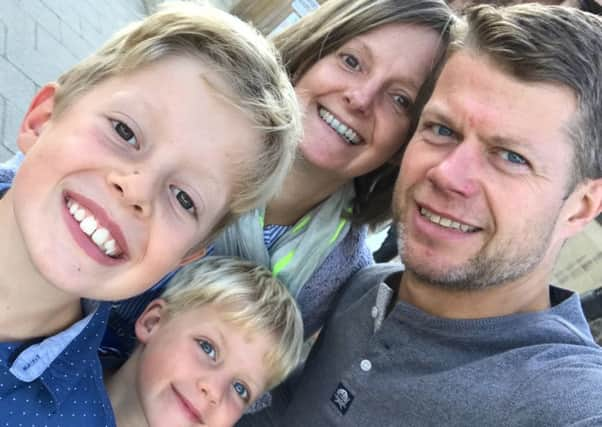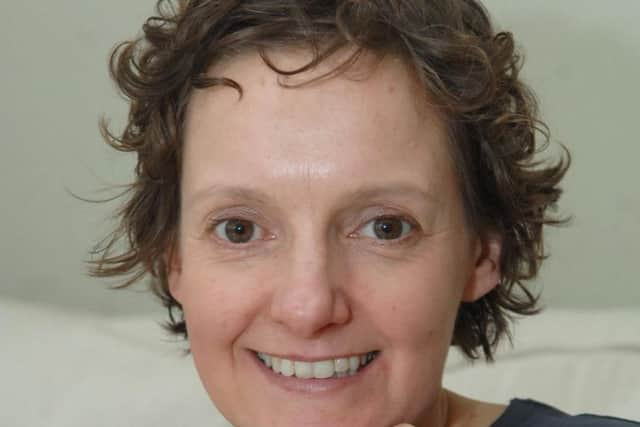Mother's cancer drug hope


A mother of two young boys is bravely battling ovarian cancer for the second time after discovering it has recurred during a check up.
Jo Beagley, 43, a management consultant from Harrogate, is now taking a new treatment at Spire Leeds Hospital – a daily medication of a drug Lynparza, pioneered in Yorkshire that is specific to her gene mutation.
Advertisement
Hide AdAdvertisement
Hide AdDiscovered at the University of Sheffield, with funding from Yorkshire Cancer Research, the drug was is primarily used for treating breast cancer, but is found to also manage ovarian cancer.


“It was tough to hear the cancer had returned, however the new drug, which was not available at the time of my diagnosis, is tailored to the knowledge of my specific condition. It’s given me a sense of optimism,” says Jo.
Jo was just 39 when she was diagnosed with Stage 3 ovarian cancer in July 2014, a condition which typically occurs in women aged over 65.
She underwent a hysterectomy, treatment with chemotherapy and an anti-angiogenesis drug which kept the cancer managed for 18 months.
Advertisement
Hide AdAdvertisement
Hide AdThen in June last year, during a scheduled check-up she discovered the cancer had returned.


“It’s always in the back of your mind that the possibility of a recurrence is high. So it wasn’t a complete surprise but hard to take all the same,” says Jo.
She under went another round of chemotherapy which succeeded in getting the cancer under control once again.
Having undergone genetic testing Jo discovered she carries the BRCA1 gene mutation, which means she carries a higher than normal risk of both breast and ovarian cancer.
Advertisement
Hide AdAdvertisement
Hide AdJo says support from family and friends and the love of her husband, Robin and two boys, James, aged ten, and Henry, eight, has helped her to deal with the condition.
“I’m trying to carry on as normal, as much as I can, for the boys who can understand much more now they are three years older,” says Jo,
“They’ve helped me though it and they give me the determination to fight it every day.”
Jo is under the care of Dr David Jackson, consultant medical oncologist at Spire Leeds Hospital and a member of its highly experienced multi-disciplinary oncology team of specialists.
Advertisement
Hide AdAdvertisement
Hide Ad“We had the option of using a new drug as a maintenance treatment to keep the cancer under control,” explains Dr Jackson.
“It’s an inhibitor known to target cancer cells that have an abnormality (mutation) in the BCRA gene, which we know that Jo has.
“Jo will need to continue on this drug for as long as it manages the cancer, and as long as it is not causing significant side effects. Hopefully this will be for a long time.
“Currently Jo’s cancer is under control, but inevitably at some time in the future the cancer will become more active.”
Advertisement
Hide AdAdvertisement
Hide AdWith Ovarian Cancer Awareness Month coming up next month, Jo takes every opportunity to raise awareness among women of this condition – the fifth most common cancer among women in the UK, and often called the “silent killer’’.
As reported previously in The Yorkshire Post, Jo wrote a blog for Yorkshire Cancer Research throughout her initial treatment to raise awareness of the symptoms and to share her account of going through the diagnosis and treatment.
She posted a few blogs last summer, when she discovered the cancer had returned, in the hope her candid insights will help other women.
Jo wants women to be aware of the symptoms so they can recognise them at early stage.
Advertisement
Hide AdAdvertisement
Hide Ad“The symptoms are difficult to spot particularly because of their similarity to other ailments.
“I only became aware of my symptoms three weeks before my original diagnosis.
“I think there’s a need to raise awareness of these symptoms so women can recognise them and get them checked out at any early stage.”
More than 7,700 are diagnosed with ovarian cancer each year.
Advertisement
Hide AdAdvertisement
Hide AdEarly diagnosis is crucial to successful treatment. The four main symptoms to look out for are:
Persistent bloating or increased stomach size;
Difficulty eating or feeling full quickly;
Needing to urinate more frequently;
Persistent stomach pain.
Ovarian Cancer Awareness month runs throughout March. For more information visit www.targetovariancancer.org